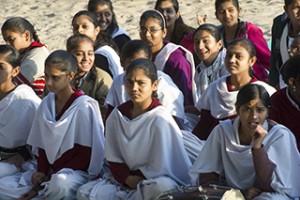To honor the third annual International Day of the Girl Child (#IDG2015), Girl Museum is celebrating with a podcast dedicated to Girls in the Museum. The podcast looks at how girls are represented in museums around the world. Featuring contributions from several members of our team, each contributor examines a different museum in order to explore how girls can be found in the museum.
Check it out on Podbean, or if you prefer, subscribe on iTunes so you don’t miss an epsiode!
Set up in 2011 by the United Nations General Assembly, International Day of the Girl Child was conceived as a day to recognise the unique struggles and challenges faced by girls globally. Occurring on the 11th of October, this year marks a significant midway point where the Millennium Development Goals (MDGs) initiated in 2000 are assessed, and new targets are set for the year 2030. It is a time where the achievements of the past 15 years are celebrated, and the shortcomings and failures are used as a basis for the new targets set for the next 15 years. It also marks the point when the generation of girls born the year the MDGs were implemented have reached adolescence, and the girls born this year will reach adolescence in 2030. 2015’s theme, The Power of the Adolescent Girl: Vision for 2030, marks both of these milestones. The years in which girls pass from childhood to young adulthood is an incredibly vulnerable time, where our future mothers, workers and leaders are molded by the attitudes and opportunities presented to them. These girls are seen as investments for our future, and in raising awareness and support for them, the UN hopes to mark the progression and attainment of the development goals. The gender divide is here seen alongside other global political, social and economic concerns which act as obstacles to the formation of a prosperous and just world. International Day of the Girl Child is a day of recognising that it is our collective duty to ensure girls all over the world are provided with equal opportunities, as people who will one day contribute to and shape our societies.

